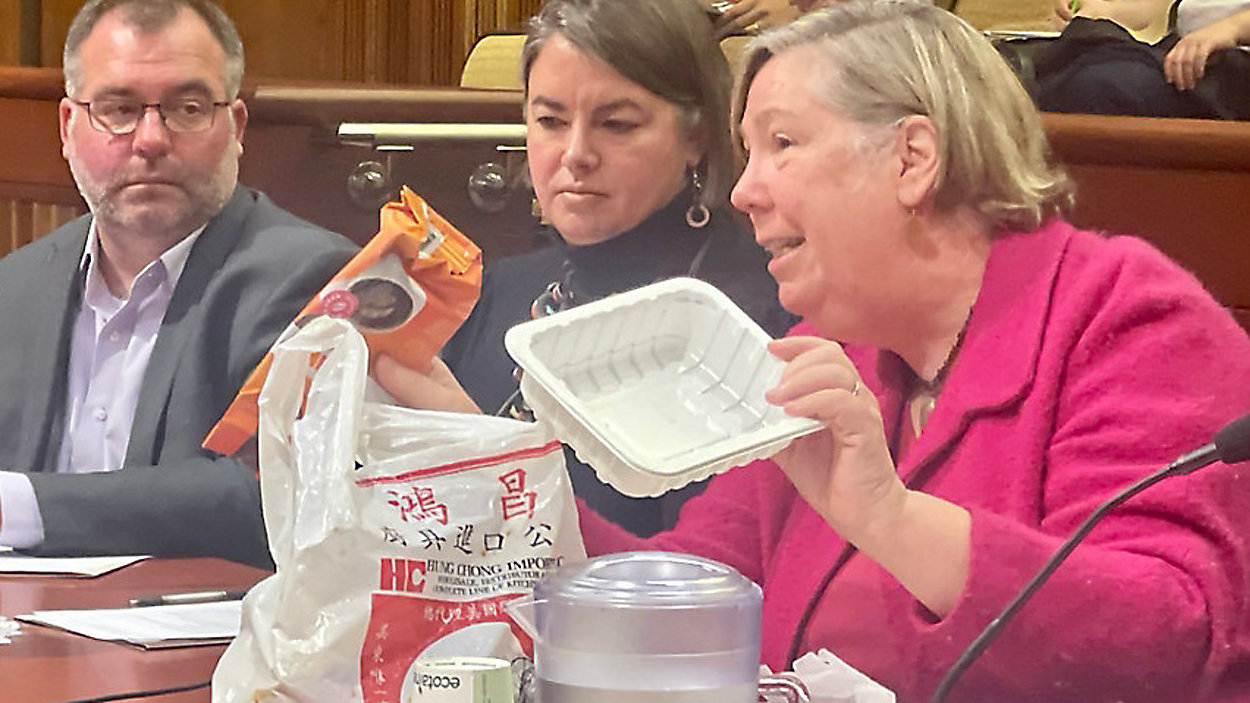
Lawmakers held a joint legislative hearing in Albany on Tuesday to examine the Packaging and Recycling Infrastructure Act, which would change how the state manages plastic waste — a focus of the state's climate action plan. The bill proposes to establish environmental standards for packaging and mandate companies with a net income of $1 million or more reduce their packaging by 10% of weight within three years, 20% in five years, 30% within eight years, 40% after a decade and by 50% in 12 years.
Judith Enck, president of Beyond Plastics, has worked with advocates on the issue for more than 30 years, and says addressing it is long overdue to divert more plastic waste from landfills and incentivize manufacturers to reduce their packaging.
"We have to solve this problem," said Enck, who formerly served as a U.S. Environmental Protection Agency regional administrator under President Barack Obama. "We can't let another 33 years go by. The problem has gotten worse. Plastic production is expected to increase 40% by 2030. We're turning our oceans into a landfill."
The legislation, amended at the end of session, would create an Extended Producer Responsibility system and charge large companies that use single-use plastic products to sell packaged goods a fee. The money would go into a fund for local recycling programs and improve related infrastructure.
New York Farm Bureau President David Fisher raised concerns to lawmakers about the consequences the Extended Producer Responsibility program would have on New York farms, and restrictions on packaging required for food safety.
He said dairy farms and processors, wineries, cideries and other food and beverage producers who use packaging will see a rise in costs they cannot afford with the downturn of the agricultural economy and increased costs from high inflation.
“Farm producers are unprepared to assume this type of responsibility, from both a management and financial perspective, especially given the current downturn of the farm economy and the increased costs of doing business resulting from the rise of inflation impacting all businesses,” Fisher said.
Fisher added farm producers are unprepared for the responsibility that would come with the significant change in how the state manages waste. The Farm Bureau wants lawmakers to take more time and conduct an impact study before initiating the change.
"We believe legislation containing this complex level of change and upheaval to the current system, which severely impacts farms and the general business community, needs much more stakeholder input, as well as an impact study prior to the legislation moving forward," Fisher said. "Within this legislation, there is a lot of uncertainty and many questions regarding the producer responsibility organizations' creation, the overall costs, as well as how packaging from out of state will be handled.”
During testimony Tuesday, Enck held up held up two different types of plastic containers and packaging found in the average kitchen. Enck explained their different colors, materials and polymers cannot currently be recycled.
"You and I as taxpayers are stuck with sending this to an incinerator or a landfill because you can't recycle it," she said.
If passed into law, the measure would ban 12 types of chemicals and three kinds of plastic used in packaging.
Assembly sponsor Deborah Glick says the measure would help address waste, which is a universal problem. Packaging represents the largest category of plastic waste.
"It is a problem in our homes — it's a problem in our communities," said Glick, who chairs the Assembly Environmental Conservation Commmittee. "It's costing us a lot."
Gov. Kathy Hochul included provisions in her executive budget earlier this year to create an Extended Producer Responsibility system. Glick and Senate Environmental Conservation Committee chair Pete Harckham introduced the counterproposal, but it fell out of the final budget. They continue to work on additional changes in plans to prioritize the bill's adoption next session.
Republican lawmakers, business leaders and packaging producers are concerned it could raise costs for consumers, limit product choice or effect local governments.
Craig Cookson, senior director of Plastics Sustainability at the American Chemistry Council agrees plastic waste should be reduced, but says the current proposal is too excessive.
"We need to make sure we account for the role that plastics and other materials play in reducing our greenhouse gas emissions and conserving resources," he said Tuesday.
Cookson added the state must focus on technology to advance recycling as New York sets higher recycling rates and expands what materials can be recycled.
Producers and business leaders told lawmakers they want to want to work with them to strike a balance in restrictions and new technology to advance recycling of plastics.
Blueland is a company making plastic-free cleaning products. Company co-founder and CEO Sarah Paiji Yoo attended Tuesday's hearing and said shifting away from plastics is possible and she supports the legislation as proposed.
"There is an incredible opportunity now to really hold businesses accountable," Paiji Yoo said. "You walk the aisles and literally everything from vitamins, to ketchup to body lotion to toothpaste, everything comes packaged in single-use plastic. And really again, businesses need to be part of the solution to provide better options to consumers."






